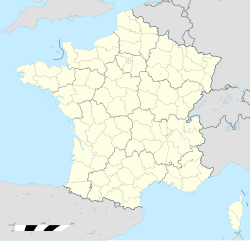Battle of Port Cros
This article needs additional citations for verification. (September 2014) |
| Battle of Port Cros | |||||||
|---|---|---|---|---|---|---|---|
| Part of the Mediterranean Theater of World War II | |||||||
 Port Cros (left) from space and Île du Levant (right). | |||||||
| |||||||
| Belligerents | |||||||
| | | ||||||
| Commanders and leaders | |||||||
| | |||||||
| Strength | |||||||
| Land: 1,800 infantry Sea: USS Somers | Land: 5 forts Sea: UJ6081 SG21 | ||||||
| Casualties and losses | |||||||
| 9 killed | UJ6081 and SG21 sunk 5 forts captured | ||||||
Location within France | |||||||
The Battle of Port Cros took place during World War II off the French Riviera in the Mediterranean Sea on the island of Port-Cros. The battle began when a United States Navy warship encountered two German warships in August 1944 while supporting the Allied Operation Dragoon. It was one of the few surface engagements fought between the US Navy and the German Kriegsmarine. Later that day, the combined American and Canadian 1st Special Service Force (the Devil's Brigade) was dropped on the main island and captured the German-held positions.
Battle
[edit]The American destroyer USS Somers—armed with six 5 in (127 mm) guns and eight 21 in (533 mm) torpedo tubes—was cruising in the Mediterranean on 15 August 1944.[1][2] She came across the former Italian Gabbiano-class corvette Camoscio of 738 long tons (750 t), which had been renamed UJ6081 by the Kriegsmarine. Also involved was the former French aviso Amiral Senes of 917 long tons (932 t), renamed SG21.[3] UJ6081 was armed with one 100 mm (3.9 in) gun and two 17.7 in (450 mm) torpedo tubes. The aviso was armed with two 4.1 in (100 mm) guns. It was early morning off Port Cros, about four hours before the Allied landing in Vichy France, when the Americans sighted the German corvette. Commander Willam Hughes ordered a torpedo attack and directed his men to battle stations.

A spread of torpedoes was launched and the Germans opened fire as they attempted to evade the torpedoes. One torpedo hit UJ6081 and she quickly began to sink; SG21 was then spotted coming to the rescue and was engaged by Somers' main gun battery. The duel lasted for a few minutes until SG21 was hit several times and began taking in water. Within a few more minutes, both German ships had sunk and Somers left the area for naval gunfire support missions against targets along the French mainland. American forces suffered no damage or casualties.
Later that day, a mixed regiment of United States Army and Canadian Army infantry, the 1st Special Service Force, was dropped onto Port Cros and captured the five forts after a day-long battle with their German garrisons. The Allies assaulted two or three forts and seized the remaining without resistance. Nine paratroopers were killed in the land battle.
Aftermath
[edit]Commander Hughes was recognized for his victory and eventually rose to the rank of rear admiral partly due to his involvement in this action. After the engagement, the U.S. Army occupied Le Levant, another island nearby. Two days later, on 17 August 1944, the former Italian corvette Antilope, renamed UJ6082, and the former Egyptian armed yacht Nimet Allah were sunk by USS Endicott with help from two British gunboats at the Battle of La Ciotat.[4]
References
[edit]Notes
- ^ Gibbons 2001, p. 405.
- ^ Jane's 2001, p. 284.
- ^ Groner, p.237
- ^ "Battle of La Ciotat August 1944 World Naval Ships Forums Archive". www.worldnavalships.com. Retrieved 2023-07-18.
Bibliography
 This article incorporates text from the public domain Dictionary of American Naval Fighting Ships.
This article incorporates text from the public domain Dictionary of American Naval Fighting Ships.- Gibbons, Tony (2001). The Encyclopedia of Ships. London: Amber Books. ISBN 978-1-905704-43-9.
- Groner, Eric (1990). German Warships 1815–1945: Major Surface Vessels. Vol. I. Annapolis, MD: Naval Institute Press. ISBN 0-87021-790-9.
- Jane's Fighting Ships of World War II. London: Random House. 2001. ISBN 0-517-67963-9 – via Archive Foundation.
External links
[edit]- www.history.navy.mil: Operation Dragoon: The Invasion of Southern France


 French
French Deutsch
Deutsch
